外研版必修2 Module 5 Newspapers and Magazines Grammar 课件(33张PPT)
文档属性
| 名称 | 外研版必修2 Module 5 Newspapers and Magazines Grammar 课件(33张PPT) |
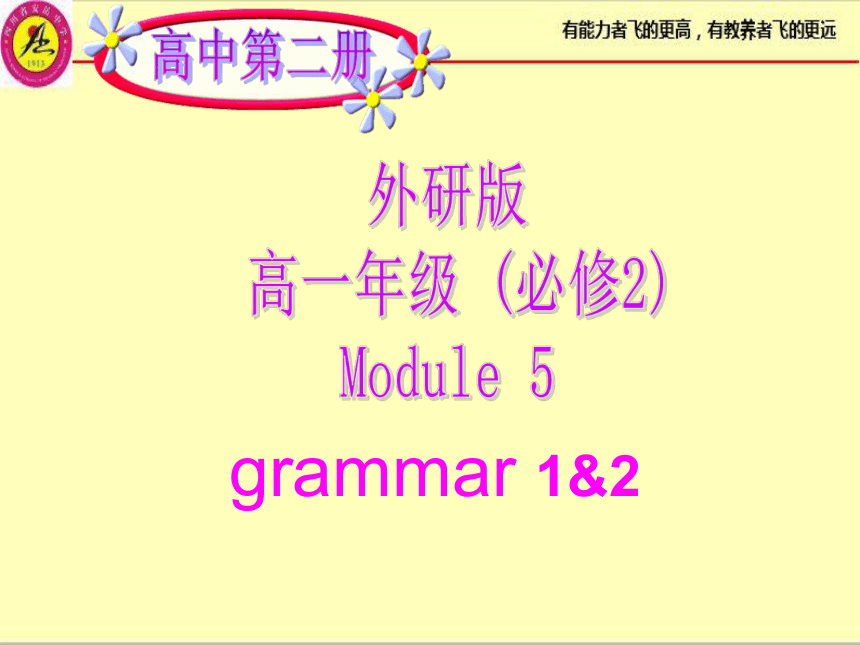
|
|
| 格式 | zip | ||
| 文件大小 | 284.0KB | ||
| 资源类型 | 教案 | ||
| 版本资源 | 外研版 | ||
| 科目 | 英语 | ||
| 更新时间 | 2020-05-15 00:00:00 | ||
图片预览

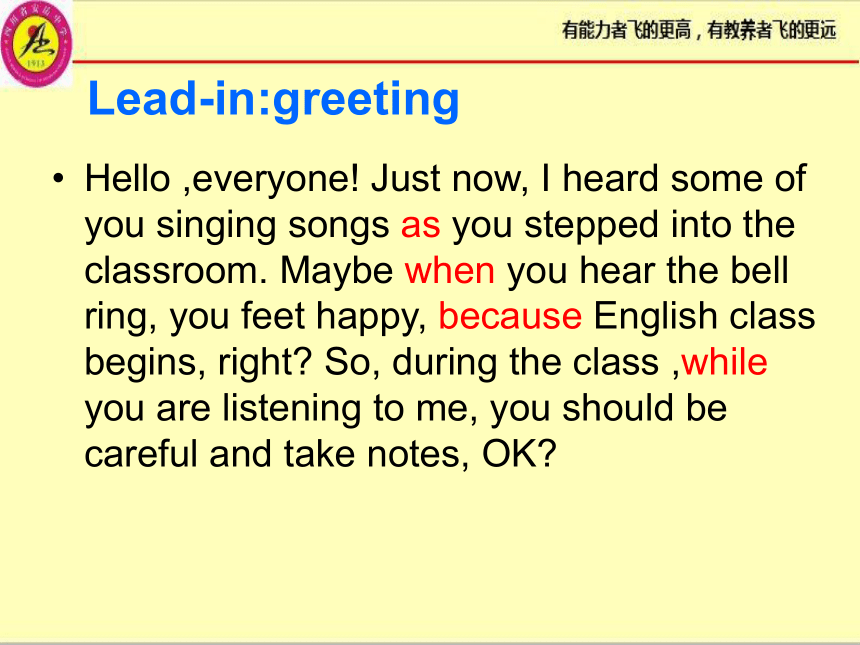
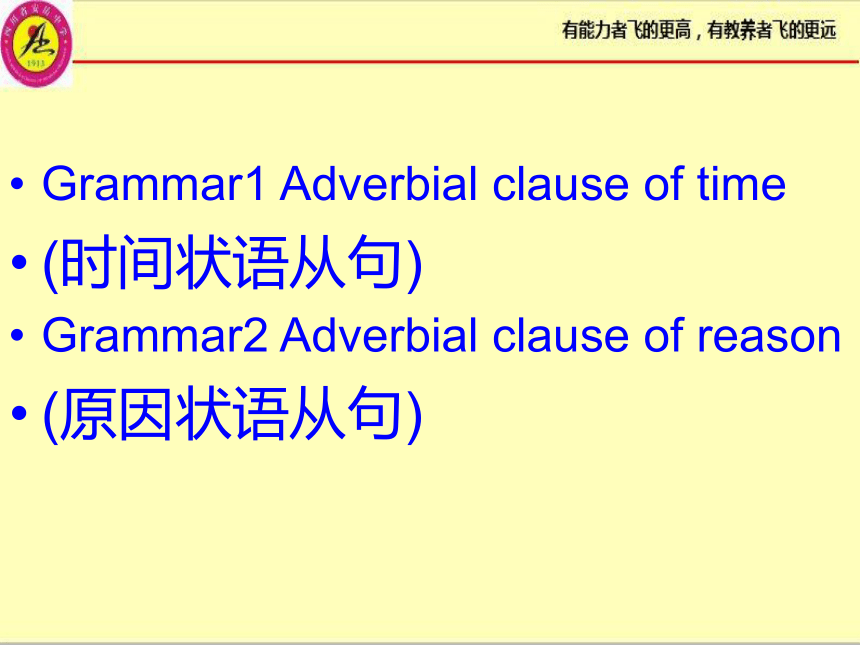
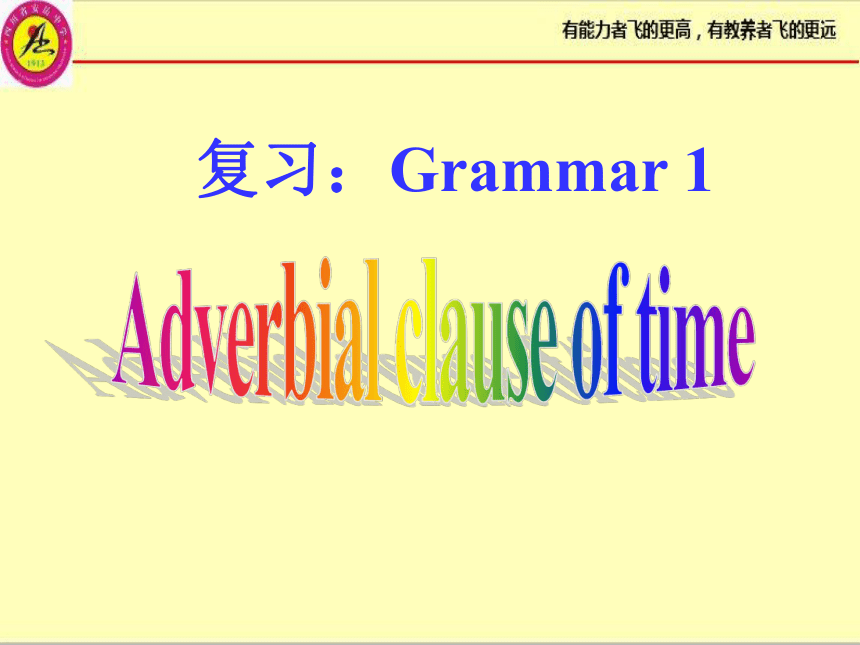
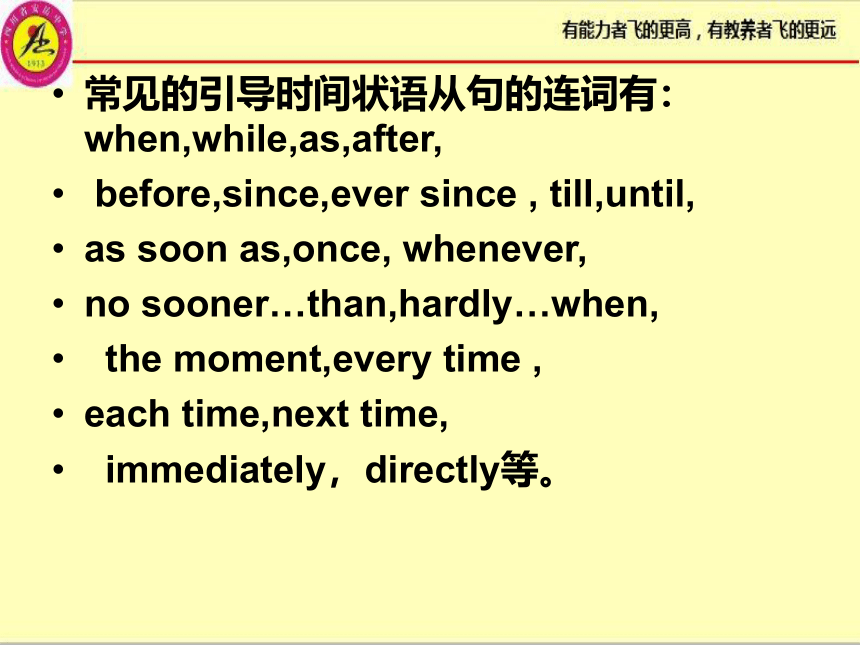
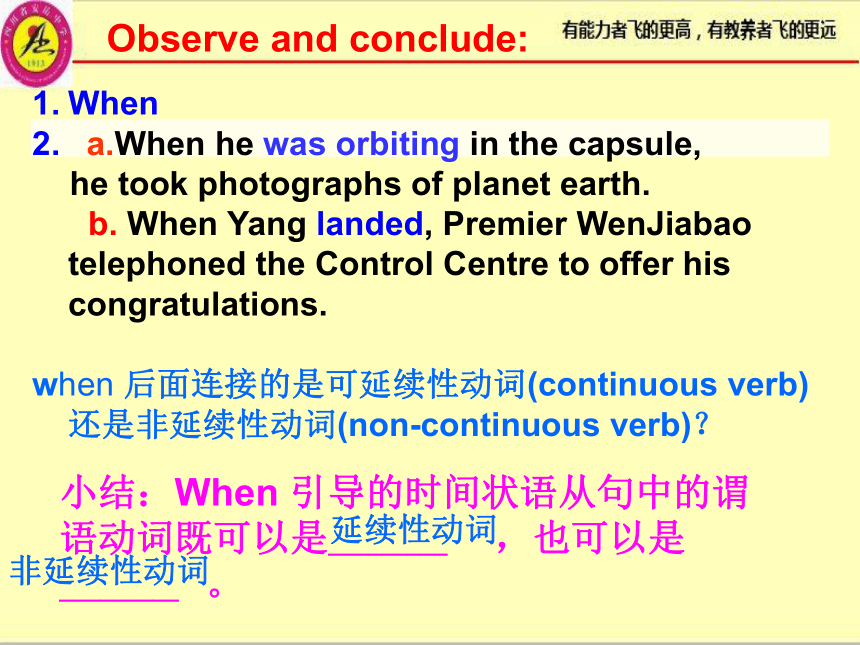
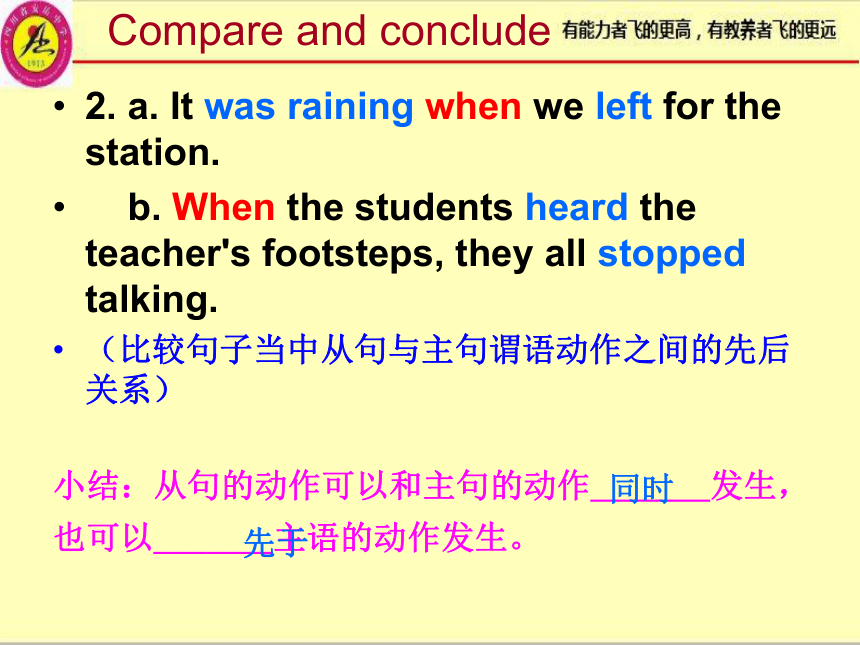


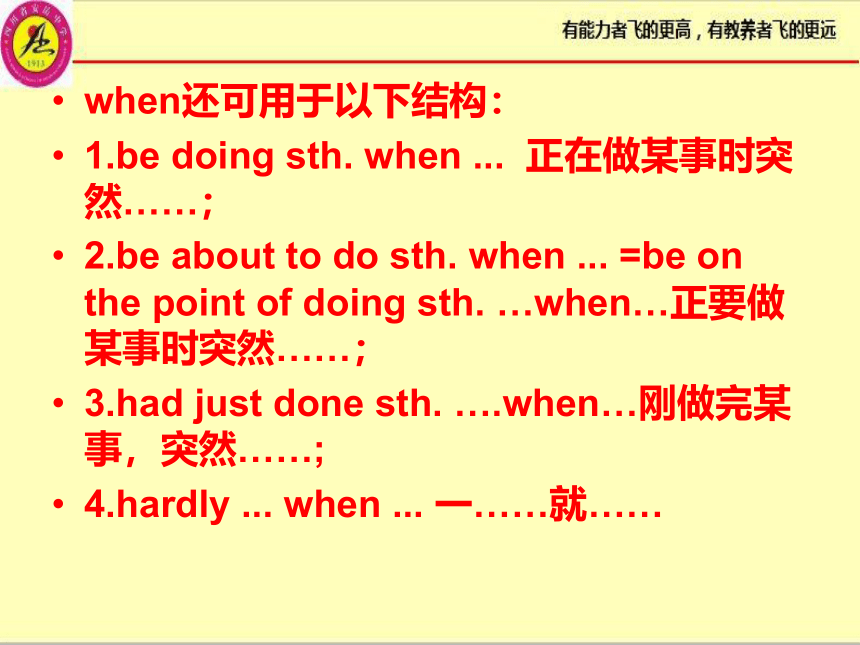


文档简介
(共33张PPT)
外研版
高一年级 (必修2)
Module 5
grammar 1&2
高中第二册
Hello ,everyone! Just now, I heard some of you singing songs as you stepped into the classroom. Maybe when you hear the bell ring, you feet happy, because English class begins, right? So, during the class ,while you are listening to me, you should be careful and take notes, OK?
Lead-in:greeting
Grammar1 Adverbial clause of time
(时间状语从句)
Grammar2 Adverbial clause of reason
(原因状语从句)
Adverbial clause of time
复习:Grammar 1
常见的引导时间状语从句的连词有:when,while,as,after,
before,since,ever since , till,until,
as soon as,once, whenever,
no sooner…than,hardly…when,
the moment,every time ,
each time,next time,
immediately,directly等。
When
a.When he was orbiting in the capsule,
he took photographs of planet earth.
b. When Yang landed, Premier WenJiabao telephoned the Control Centre to offer his congratulations.
when 后面连接的是可延续性动词(continuous verb)还是非延续性动词(non-continuous verb)?
小结:When 引导的时间状语从句中的谓语动词既可以是_________ ,也可以是_________ 。
延续性动词
非延续性动词
Observe and conclude:
Compare and conclude
2. a. It was raining when we left for the station.
b. When the students heard the teacher's footsteps, they all stopped talking.
(比较句子当中从句与主句谓语动作之间的先后关系)
小结:从句的动作可以和主句的动作_________发生,也可以_________主语的动作发生。
同时
先于
Practice:
The games my parents taught me where I
was a child turned out to be very useful
later in my life.
2. 单项选择(2013安徽高考)
It is much easier to make friends _____you have similar interests.
A.unless B.when
C.even though D.so that
________
when
1.改错(2018年全国卷2)
B
2. a. I was preparing lunch in the kitchen when the power went off.
b. We were about to start when it began to rain.
c.I was on the point of leaving when it ban to rain.
d.I had just finished my homework when my mother asked me to look after my sister.
e.The game had hardly begun when it started raining.
观察句子,找出常和when连用的句型有哪些?
when还可用于以下结构:
1.be doing sth. when ...??正在做某事时突然……;
2.be about to do sth. when ...?=be on the point of doing sth. …when…正要做某事时突然……;
3.had just done sth. ….when…刚做完某事,突然……;
4.hardly ... when ...?一……就……
单项填空:
We were going out for a Christmas meal together _____ the accident happened . ( )
A. unless B. until C. while D. when
D
2.while
1.While he was travelling in space,
Yang spoke to two astronauts aboard
the International Space Station.
2.While he was taking a walk in the
street, he saw an accident.
观察while 是和可延续动词连用还是非延续性动词连用?
While后的动词与主句谓语动词哪个先发生?
总结:while引导的时间状语从句中的谓语动
词是延续性动词,强调主句谓语动词和从句谓语动词所表示的动作或状态是同时发生的。
Translate the following sentences:
1.We must strike while the iron is hot.
2.While she was listening to radio, she fell asleep.
3.While he loves his students, he is strict with them.
4.Some people waste food while others don’t have enough.
While除了表示“当……时候”以外,还有“虽然,尽管”,“然而”之意。
3.As
. a. As time passed, things seemed to get
worse.
b. As the students walked to their
classroom, they sang happily.
as如何翻译?
主句动作与从句动作哪个先发生?还是同时发生?
as用法小结:
as引导时间状语从句时,表示“随着,一边……一边……”,侧重主句和从句两个动作同时发生或主句动作随从句动作的变化而变化。
Practice:
Rational cloze(语法填空)(2016年全国卷3)
Over time, _____the population grew,people began cutting food into small pieces so it would cook more quickly.
as
1) We had sailed four days and four nights before we saw land.
我们航行了四天四夜才看到陆地。
2) We hadn’t run a mile before he felt tired.
我们跑了还不到一英里他就累了。
3)Please write it down before you forget it.
趁你现在没忘就把它记下来。
4)Before I could get in a word, he had measured me.
我还没来得及插话他就给我量好了尺寸.
5) It will be half a year before I come back.
半年之后我才能回来。
6) It won’t be long before we meet again.
要不了多久我们就可以再见面了。
Try to translate the following sentences:
总结:与before 连用的句型:
1.It will be/was+一段时间+before…要过/过了……时间才……
2.It won’t be/wasn’t +一段时间+before…没过多久就……
before 通常可以翻译为“在……之前”“……才……” “ ……就……” “还没来得及……就……” “趁着还没……就……”
单项填空:
1.It’ll be a year _____ the next Olympic
Games are held in Tokyo in 2020. ( )
A. since B. when C. before D. until
2. (2015重庆高考)If you miss this chance,it may be years_____you get another one. ( )
A.as B. before C.since D.after
3. (2015天津高考) We need to get to the root of the problem _____we can solve it.( )
A.while B.after C.before D.as
C
B
C
I worked until he came back. 我一直工作到他回来为止。
I didn’t work until he came back. 他回来我才开始工作。
until意为“直到……为止”
not until意为“直到……才”
5.till/until Observe:
I didn’t go to bed until I finished my homework.
1.在not…until/till…结构中,当not until…置于句首时,主句要部分倒装。
Not until I finished my homework did I go to bed.
2.当not…until…结构中用于强调句型时,句子结构为:It is/was not until…that…
It was not until I finished my homework that I went to bed.
6.由as soon as, immediately, directly, instantly, the moment, the instant, the minute, the second , hardly…when…,no sooner…than…等引导的时间状语从句,这些连词都表示“一……就”。
Translation :
The moment I heard the news, I went to the spot.
我一听到消息,我就去了出事地点。
As soon as I reach Canada, I will ring you up.
我一到加拿大,就给你来电话。
句型转换:
I’ll call you as soon as I get home from work .
= I’ll call you the moment I get home from work .
= I’ll call you immediately I get home from work .
2. I had no sooner walked in the door than the phone rang.
= No sooner had I walked in the door than the phone rang .
= I had hardly walked in the door when the phone rang.
= Hardly had I walked in the door when the phone rang .
总结: hardly…when…,no sooner…than…句型中,主句要有过去完成时, no sooner和hardly置于句首,主句用半倒装
。
1.我第一次见到她就爱上了她。
The first time I met her,I fell in love with her.
2.什么时候你需要我的车,我都会借给你的。
Any time you need my car,I will lend it to you.
3.每次我去看他, 他都不在。
Every time I went to see him, he was out.
4.到他14岁时,他已经学会了如何弹钢琴。
By the time he was 14,he had learned how to play piano.
7.the first/second/…/last time/ next time(下次)/ any time(任何时候)/ each time/ every time (每次)/ by the time等
Grammar 2
Adverbial Clause of Reason
— Why didn’t he come yesterday?
— Because he had something important to do.
2. As he was tired, he went to bed early.
3.Since you don’t like to do it , I’ll ask someone else.
4. It rained last night, for the ground is wet this morning.
5. Now that you have finished your homework, you may go home now.
1.---Why didn’t he come yesterday?
---Because he had something important to do.
小结:because所表示的原因含有很强的因果关系,用来回答why提出的问题,在强调原因时,从句可以置于主句前或之后。
2. As he was tired, he went to bed early.
As语气不如because强,从句常放主句之前
3. Now that you have finished your homework, you may go home now.
Now that也可以用来引导原因状语从句,翻译为“既然”
4.It rained last night, for the ground is wet this morning.
For 也常用来表示原因,一般用来表示补充说明辅助性理由或提供上文未交代的情况,通常与主句用逗号隔开。
5. Since you don’t like to do it , I’ll ask someone else.
如果表示已知的或是比较明显的原因,可以用now that或since(既然)。
1._____ I’ve got my own car , I don’t get as much exercise as I used to . ( )
A.Even if B. except that
C.Now that D.Until
2.Parents should take their children’s requests for sunglasses seriously ______ eye protection is necessary in sunny weather . ( )
A. because B. though
C. unless D. if
C
A
Reflection(反思):
What have you leant in this class?
1. Finish the grammar exercise in the Workbook on p91-92, 1-4.
2.Review what we have learnt in this class.
Thank you.
外研版
高一年级 (必修2)
Module 5
grammar 1&2
高中第二册
Hello ,everyone! Just now, I heard some of you singing songs as you stepped into the classroom. Maybe when you hear the bell ring, you feet happy, because English class begins, right? So, during the class ,while you are listening to me, you should be careful and take notes, OK?
Lead-in:greeting
Grammar1 Adverbial clause of time
(时间状语从句)
Grammar2 Adverbial clause of reason
(原因状语从句)
Adverbial clause of time
复习:Grammar 1
常见的引导时间状语从句的连词有:when,while,as,after,
before,since,ever since , till,until,
as soon as,once, whenever,
no sooner…than,hardly…when,
the moment,every time ,
each time,next time,
immediately,directly等。
When
a.When he was orbiting in the capsule,
he took photographs of planet earth.
b. When Yang landed, Premier WenJiabao telephoned the Control Centre to offer his congratulations.
when 后面连接的是可延续性动词(continuous verb)还是非延续性动词(non-continuous verb)?
小结:When 引导的时间状语从句中的谓语动词既可以是_________ ,也可以是_________ 。
延续性动词
非延续性动词
Observe and conclude:
Compare and conclude
2. a. It was raining when we left for the station.
b. When the students heard the teacher's footsteps, they all stopped talking.
(比较句子当中从句与主句谓语动作之间的先后关系)
小结:从句的动作可以和主句的动作_________发生,也可以_________主语的动作发生。
同时
先于
Practice:
The games my parents taught me where I
was a child turned out to be very useful
later in my life.
2. 单项选择(2013安徽高考)
It is much easier to make friends _____you have similar interests.
A.unless B.when
C.even though D.so that
________
when
1.改错(2018年全国卷2)
B
2. a. I was preparing lunch in the kitchen when the power went off.
b. We were about to start when it began to rain.
c.I was on the point of leaving when it ban to rain.
d.I had just finished my homework when my mother asked me to look after my sister.
e.The game had hardly begun when it started raining.
观察句子,找出常和when连用的句型有哪些?
when还可用于以下结构:
1.be doing sth. when ...??正在做某事时突然……;
2.be about to do sth. when ...?=be on the point of doing sth. …when…正要做某事时突然……;
3.had just done sth. ….when…刚做完某事,突然……;
4.hardly ... when ...?一……就……
单项填空:
We were going out for a Christmas meal together _____ the accident happened . ( )
A. unless B. until C. while D. when
D
2.while
1.While he was travelling in space,
Yang spoke to two astronauts aboard
the International Space Station.
2.While he was taking a walk in the
street, he saw an accident.
观察while 是和可延续动词连用还是非延续性动词连用?
While后的动词与主句谓语动词哪个先发生?
总结:while引导的时间状语从句中的谓语动
词是延续性动词,强调主句谓语动词和从句谓语动词所表示的动作或状态是同时发生的。
Translate the following sentences:
1.We must strike while the iron is hot.
2.While she was listening to radio, she fell asleep.
3.While he loves his students, he is strict with them.
4.Some people waste food while others don’t have enough.
While除了表示“当……时候”以外,还有“虽然,尽管”,“然而”之意。
3.As
. a. As time passed, things seemed to get
worse.
b. As the students walked to their
classroom, they sang happily.
as如何翻译?
主句动作与从句动作哪个先发生?还是同时发生?
as用法小结:
as引导时间状语从句时,表示“随着,一边……一边……”,侧重主句和从句两个动作同时发生或主句动作随从句动作的变化而变化。
Practice:
Rational cloze(语法填空)(2016年全国卷3)
Over time, _____the population grew,people began cutting food into small pieces so it would cook more quickly.
as
1) We had sailed four days and four nights before we saw land.
我们航行了四天四夜才看到陆地。
2) We hadn’t run a mile before he felt tired.
我们跑了还不到一英里他就累了。
3)Please write it down before you forget it.
趁你现在没忘就把它记下来。
4)Before I could get in a word, he had measured me.
我还没来得及插话他就给我量好了尺寸.
5) It will be half a year before I come back.
半年之后我才能回来。
6) It won’t be long before we meet again.
要不了多久我们就可以再见面了。
Try to translate the following sentences:
总结:与before 连用的句型:
1.It will be/was+一段时间+before…要过/过了……时间才……
2.It won’t be/wasn’t +一段时间+before…没过多久就……
before 通常可以翻译为“在……之前”“……才……” “ ……就……” “还没来得及……就……” “趁着还没……就……”
单项填空:
1.It’ll be a year _____ the next Olympic
Games are held in Tokyo in 2020. ( )
A. since B. when C. before D. until
2. (2015重庆高考)If you miss this chance,it may be years_____you get another one. ( )
A.as B. before C.since D.after
3. (2015天津高考) We need to get to the root of the problem _____we can solve it.( )
A.while B.after C.before D.as
C
B
C
I worked until he came back. 我一直工作到他回来为止。
I didn’t work until he came back. 他回来我才开始工作。
until意为“直到……为止”
not until意为“直到……才”
5.till/until Observe:
I didn’t go to bed until I finished my homework.
1.在not…until/till…结构中,当not until…置于句首时,主句要部分倒装。
Not until I finished my homework did I go to bed.
2.当not…until…结构中用于强调句型时,句子结构为:It is/was not until…that…
It was not until I finished my homework that I went to bed.
6.由as soon as, immediately, directly, instantly, the moment, the instant, the minute, the second , hardly…when…,no sooner…than…等引导的时间状语从句,这些连词都表示“一……就”。
Translation :
The moment I heard the news, I went to the spot.
我一听到消息,我就去了出事地点。
As soon as I reach Canada, I will ring you up.
我一到加拿大,就给你来电话。
句型转换:
I’ll call you as soon as I get home from work .
= I’ll call you the moment I get home from work .
= I’ll call you immediately I get home from work .
2. I had no sooner walked in the door than the phone rang.
= No sooner had I walked in the door than the phone rang .
= I had hardly walked in the door when the phone rang.
= Hardly had I walked in the door when the phone rang .
总结: hardly…when…,no sooner…than…句型中,主句要有过去完成时, no sooner和hardly置于句首,主句用半倒装
。
1.我第一次见到她就爱上了她。
The first time I met her,I fell in love with her.
2.什么时候你需要我的车,我都会借给你的。
Any time you need my car,I will lend it to you.
3.每次我去看他, 他都不在。
Every time I went to see him, he was out.
4.到他14岁时,他已经学会了如何弹钢琴。
By the time he was 14,he had learned how to play piano.
7.the first/second/…/last time/ next time(下次)/ any time(任何时候)/ each time/ every time (每次)/ by the time等
Grammar 2
Adverbial Clause of Reason
— Why didn’t he come yesterday?
— Because he had something important to do.
2. As he was tired, he went to bed early.
3.Since you don’t like to do it , I’ll ask someone else.
4. It rained last night, for the ground is wet this morning.
5. Now that you have finished your homework, you may go home now.
1.---Why didn’t he come yesterday?
---Because he had something important to do.
小结:because所表示的原因含有很强的因果关系,用来回答why提出的问题,在强调原因时,从句可以置于主句前或之后。
2. As he was tired, he went to bed early.
As语气不如because强,从句常放主句之前
3. Now that you have finished your homework, you may go home now.
Now that也可以用来引导原因状语从句,翻译为“既然”
4.It rained last night, for the ground is wet this morning.
For 也常用来表示原因,一般用来表示补充说明辅助性理由或提供上文未交代的情况,通常与主句用逗号隔开。
5. Since you don’t like to do it , I’ll ask someone else.
如果表示已知的或是比较明显的原因,可以用now that或since(既然)。
1._____ I’ve got my own car , I don’t get as much exercise as I used to . ( )
A.Even if B. except that
C.Now that D.Until
2.Parents should take their children’s requests for sunglasses seriously ______ eye protection is necessary in sunny weather . ( )
A. because B. though
C. unless D. if
C
A
Reflection(反思):
What have you leant in this class?
1. Finish the grammar exercise in the Workbook on p91-92, 1-4.
2.Review what we have learnt in this class.
Thank you.
